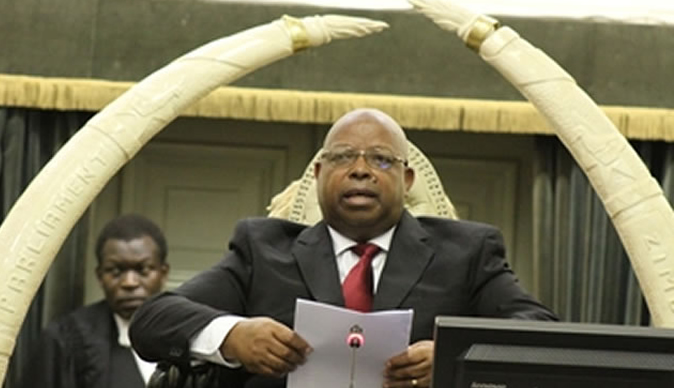


 JACOB Mudenda, the Speaker of Parliament, faces possibly the sternest test in his political career as he adjudicates in a potentially explosive case in which both factions of the Movement for Democratic Change (MDC-T) are claiming legitimacy of the troubled movement in the National Assembly, the Financial Gazette can report.
JACOB Mudenda, the Speaker of Parliament, faces possibly the sternest test in his political career as he adjudicates in a potentially explosive case in which both factions of the Movement for Democratic Change (MDC-T) are claiming legitimacy of the troubled movement in the National Assembly, the Financial Gazette can report.
Last week, MDC-T secretary-general Tendai Biti, who leads a faction calling itself “the renewal team” wrote to the Speaker of Parliament claiming control of the party in the aftermath of a palace coup that saw Morgan Tsvangirai being suspended from the movement along with his close lieutenants. Biti, a practicing lawyer, said it was only him, as secretary general, who has the right to write to the Speaker on any issue with respect to the MDC-T’s Members of Parliament, particularly in terms of Section 129 of the Constitution. The section he referred to deals with the tenure of a seating MP.
One of the clauses under this section stipulates that the seat of a legislator becomes vacant if the MP has ceased to belong to the political party of which he or she was a member when elected to Parliament and the political party concerned, by written notice to the Speaker or President of the Senate, as the case may be, has declared that the member has ceased to belong to it.
In writing to Mudenda, the MDC-T secretary-general launched a pre-emptive strike to block the Tsvangirai camp from recalling those who are fighting in his corner. And true to his prediction, Tsvangirai and his group have come out with guns blazing. Apart from expelling Biti and the other so-called rebels from the party, Tsvangirai’s deputy, Thokozani Khupe, wrote to Mudenda at the weekend saying she was the only one from the MDC-T who could communicate with Parliament.
Khupe is the MDC-T’s leader of the House. Tsvangirai’s faction, according to sources, wants to recall the “rebel” MPs numbering 11 from the legislative assembly in the event that Mudenda rules in their favour.The reverse is also likely to be true whereby all those seen as aligned to Tsvangirai could be sent packing in the event that the Speaker rules in favour of the “renewal team”.
Either way, this would result in by-elections in the affected constituencies, a prospect that could see the MDC-T losing more ground to ZANU-PF, which already holds a clear majority in the National Assembly. And true to his prediction, Tsvangirai and his group have come out with guns blazing. Apart from expelling Biti and the other so-called rebels from the party, Tsvangirai’s deputy, Thokozani Khupe, wrote to Mudenda at the weekend saying she was the only one from the MDC-T who could communicate with Parliament.
Khupe is the MDC-T’s leader of the House.
Tsvangirai’s faction, according to sources, wants to recall the “rebel” MPs numbering about 10 from the legislative assembly in the event that Mudenda rules in their favour. The reverse is also likely to be true whereby all those seen as aligned to Tsvangirai could be sent packing in the event that the Speaker rules in favour of the “renewal team”. Presently, the MDC-T holds 39 seats in the august House against ZANU-PF’s 149.
All eyes have now turned on Mudenda who will adjudicate in the row that has split the country’s largest opposition party right through the middle. Armed with letters from both camps, Mudenda, a lawyer by profession, has to straddle a tight rope in his interpretation of the laws of the land and exercise impartiality, lest he risks setting a dangerous precedent. Being a ZANU-PF cadre himself, not many expect Mudenda to be impartial.
Skeptics were this week adamant that Mudenda could be swayed in his decision by how ZANU-PF would benefit from the outcome. With Tsvangirai having been a thorn in ZANU-PF’s backside since 1999, when the MDC was formed, they reason that the odds would be heavily staked against him. Tsvangirai’s faction has in recent weeks been pointing an accusing finger at ZANU-PF and Welshman Ncube’s MDC party of fomenting the infighting in their party. In an interview with the Financial Gazette, Mudenda said he will not be rushed into making a decision on the matter.
He said: “I am taking my time to study the submissions that are before me as we are dealing here with the supreme law of the land and it is a decision that cannot be rushed.”
Asked how he would navigate the difficult terrain of not being seen as taking any sides, Mudenda said: “That is why I am seized with the matter and I am making sure that all the sides of the case are before me, for an impartial decision to be made.”
Any decision to be made by Mudenda is certain to result in a high-stakes political contest between the two factions. Biti’s faction is citing Section 6.4 of the party’s constitution to reinforce its argument. Part “h’ of the section says it is the responsibility of the secretary-general, in this case Biti, to act as spokesperson of the party on general party affairs, including issues on the secretariat and on administrative matters concerning the party. And yet the subsequent paragraph seems to put a caveat to the secretary-general’s legroom. It says the secretary-general can exercise such powers as may be assigned to him or her within the provision of the constitution by the president of the MDC-T or the National Executive or the National Council.
It is this part that the Tsvangirai faction has latched onto, as they are insisting that the meeting convened by Biti on April 26 was a nullity. Tsvangirai’s camp is of the view that the responsibility to convene a National Council meeting rests with the national chairman, Lovemore Moyo. Legal experts said the options available to any faction unhappy with the Speaker of Parliament’s decision would be to take the matter to the courts.
“It can hardly be denied that the dispute between the MDC factions has placed the Speaker of Parliament in an unenviable position,” said Tawanda Zhuwarara, a lawyer.
“In terms of section 129 (1) (k) of the Constitution once a member of the National Assembly ceases to belong to the political party of which he or she was a member when elected to Parliament and the political party concerned, by written notice to the Speaker or the President of the Senate, as the case may be, has declared that the member has ceased to belong to it then the Speaker is empowered to declare the seat in the concerned constituency vacant.”
Zhuwarara said Section 129 (1) (k) seems to have been designed to deal with a phenomenon called floor crossing where an MP either changes political allegiance or leaves the party that sponsored his bid for a parliamentary seat.
“The current situation is unique in that both MDC-T factions claim to be the legitimate formation. This presents a problem because MPs from both factions will argue that they never ceased to belong to MDC-T and as such are immune from the operation of section 129 (1) (k).
“As it stands the Speaker has received two conflicting instructions from persons purporting to represent the same party. This is a legal dispute and as such it is best that a court of law resolve the crisis. It may very well be prudent that the Speaker preserves the status quo and request the parties to furnish him with conclusive evidence as to who the real MDC-T is.” Another lawyer, Terrence Hussein, agreed that there was nowhere else for the matter to end but in the courts.
“The Speaker will have to take one of two options, that is to reject one side’s version of events and take the other side. The other option that is available is for the Speaker is to simply say that he is in a quandary and refer the matter to the courts. Either way the case will end up in the courts as it is likely that any aggrieved faction will appeal the Speaker’s decision and turn to the courts for recourse,” Hussein said.